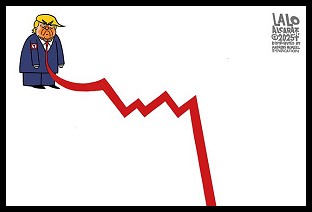- with Brad Friedman
[An earlier version of this article was originally published by Truthout...]
 Both election integrity advocates and dissembling GOP proponents of Photo ID voting restrictions were taken by surprise in late 2013 when 7th Circuit Court Judge Richard A. Posner said, during an interview with HuffPo Live, that the landmark 2008 Supreme Court decision on the matter "would have been decided differently" if the Court had known then "about the abuse of voter identification laws."
Both election integrity advocates and dissembling GOP proponents of Photo ID voting restrictions were taken by surprise in late 2013 when 7th Circuit Court Judge Richard A. Posner said, during an interview with HuffPo Live, that the landmark 2008 Supreme Court decision on the matter "would have been decided differently" if the Court had known then "about the abuse of voter identification laws."
That, in and of itself, was a remarkable turn of events. What was ultimately to come was even more so.
Crawford v. Marion County Election Board is the case which Republican proponents of strict Photo ID voting laws now (incorrectly and often disingenuously) cite as giving them carte blanche to enact similar laws in other states, irrespective of the extent to which photo ID laws serve to disenfranchise demographic groups --- minorities, students, the poor, women --- that all tend to vote for Democrats.
Posner is not just any judge. He is a renowned legal scholar and Reagan appointee to the federal bench, who has served on the U.S. 7th Circuit Court of Appeal since 1981. More importantly here, Posner was the author of the 7th Circuit's opinion in Crawford. In that case, Posner rejected an allegation that Indiana's polling place photo ID restriction was unconstitutional. That decision was affirmed at the time by the U.S. Supreme Court.
Posner, who is, as Yale Law Professor Fred Shapiro notes, the most cited jurist of the 20th Century, was not alone in his view in 2013 year that Crawford "would have been decided differently" if the Court knew then what it knows now.
Former Supreme Court Justice John Paul Stevens, the author of the plurality opinion in Crawford --- an opinion that was joined by Chief Justice Roberts and Justice Kennedy --- told the Wall Street Journal following Posner's remarks at the time, that he "always thought that [dissenting Justice] David Souter got the thing correct, but my own problem with the case was that I didn't think the record [before the Court in 2008] supported everything he said in his opinion." Souter would have struck down the Indiana law as unconstitutional because, as he argued at the time, it "threatens to impose nontrivial burdens" upon the right to vote.
Joined by four other 7th Circuit jurists last October, Posner penned an extraordinarily powerful and compelling dissent [PDF] in Wisconsin's photo ID voting case. The previously missing evidence is now in, as the judge meticulously detailed in the opinion. GOP claims that photo ID restrictions are needed to combat "voter fraud", he wrote, are "a mere fig leaf for efforts to disenfranchise voters likely to vote for the political party that does not control the state government"...
There is only one motivation for imposing burdens on voting that are ostensibly designed to discourage voter-impersonation fraud, if there is no actual danger of such fraud, and that is to discourage voting by persons likely to vote against the party responsible for imposing the burdens.
Posner's carefully crafted dissent does more than establish why the U.S. Supreme Court should ultimately sustain the District Court's finding that Wisconsin's photo ID law is both unconstitutional and a violation of the Voting Rights Act --- a finding later echoed by a federal District Court in Texas as well. Posner's dissent obliterates the factual premise that had served as a pillar upon which his, and subsequently the Supreme Court's, decisions in Crawford were based.
Polling place photo ID laws do not promote voter confidence in the integrity of elections, as Posner and the Crawford Supreme Court plurality had erroneously assumed. The assertion that they do was a "mistake" --- Posner's mistake! --- and he now admits as much, with the support of devastating new data from recent studies to back him up.
His powerful dissent amounts to more than just a response to the Wisconsin GOP's new Photo ID voting law. It is an elegant plea that the U.S. Supreme Court finally right a grievous wrong that he was personally responsible for. Posner presents an astonishing, air-tight case for ruling that all "strict Photo ID laws," which, as he demonstrates, have only been enacted in states sporting GOP-controlled legislatures, must now be struck-down as unconstitutional...
--- Click here for REST OF STORY!... ---
 During our most recent Green News Report, we sang the praises of California for a number of recent, noteworthy environmental accomplishments and initiatives.
During our most recent Green News Report, we sang the praises of California for a number of recent, noteworthy environmental accomplishments and initiatives.

 Trump EPA Guts Enviro Justice Office: 'BradCast' 4/24/25
Trump EPA Guts Enviro Justice Office: 'BradCast' 4/24/25 'Green News Report' 4/24/25
'Green News Report' 4/24/25
 Nation's Largest Broadcaster Mandates News Outlets Hoax Viewers to Help Gut FCC Rules: 'BradCast' 4/23/25
Nation's Largest Broadcaster Mandates News Outlets Hoax Viewers to Help Gut FCC Rules: 'BradCast' 4/23/25 Trump's FCC on Precipice of Ending All Limits on Corporate Control of Local TV Stations
Trump's FCC on Precipice of Ending All Limits on Corporate Control of Local TV Stations GOP Earth Day 2025 Hypocrisies and Dilemmas: 'BradCast' 4/22/25
GOP Earth Day 2025 Hypocrisies and Dilemmas: 'BradCast' 4/22/25 'Green News Report' 4/22/25
'Green News Report' 4/22/25 Pope Francis Dies,
Pope Francis Dies, Sunday
Sunday  Sunday 'Zero Day' Toons
Sunday 'Zero Day' Toons Soc. Sec. Expert Warns DOGE Hastening Collapse, Privati-zation: 'BradCast' 4/10/2025
Soc. Sec. Expert Warns DOGE Hastening Collapse, Privati-zation: 'BradCast' 4/10/2025 'Green News Report' 4/10/25
'Green News Report' 4/10/25 Trump Blinks, Chaos Reigns, Markets Spike as Many Tariffs Remain Despite 90-Day 'Pause': 'BradCast' 4/9/25
Trump Blinks, Chaos Reigns, Markets Spike as Many Tariffs Remain Despite 90-Day 'Pause': 'BradCast' 4/9/25 SCOTUS Deportation Ruling Grimmer Than First Appears: 'BradCast' 4/8/25
SCOTUS Deportation Ruling Grimmer Than First Appears: 'BradCast' 4/8/25 'Green News Report' 4/8/25
'Green News Report' 4/8/25 Cliff Diving with Donald: 'BradCast' 4/7/25
Cliff Diving with Donald: 'BradCast' 4/7/25 Sunday 'Don't Look Down' Toons
Sunday 'Don't Look Down' Toons 'Green News Report' 4/3/25
'Green News Report' 4/3/25 'Mob Boss' Trump's Trade Sanctions Tank U.S., World Markets: 'BradCast' 4/3/25
'Mob Boss' Trump's Trade Sanctions Tank U.S., World Markets: 'BradCast' 4/3/25 Crawford Landslide in WI; Booker Makes History in U.S. Senate: 'BradCast' 4/2/25
Crawford Landslide in WI; Booker Makes History in U.S. Senate: 'BradCast' 4/2/25 Judge Ends Challenge to GA's Unverifiable, Insecure Vote System: 'BradCast' 4/1/25
Judge Ends Challenge to GA's Unverifiable, Insecure Vote System: 'BradCast' 4/1/25 Bad Court, Election News for Trump is Good News for U.S.: 'BradCast' 3/31
Bad Court, Election News for Trump is Good News for U.S.: 'BradCast' 3/31 Vets Push Back at Plan to Slash Health Care, 80K V.A. Jobs: 'BradCast' 3/27/25
Vets Push Back at Plan to Slash Health Care, 80K V.A. Jobs: 'BradCast' 3/27/25 Signal Scandal Worsens for Trump, GOP; Big Dem Election Wins in PA: 'BradCast' 3/26
Signal Scandal Worsens for Trump, GOP; Big Dem Election Wins in PA: 'BradCast' 3/26 'Emptywheel': Trump NatSec Team Should 'Resign in Disgrace': 'BradCast' 3/25/25
'Emptywheel': Trump NatSec Team Should 'Resign in Disgrace': 'BradCast' 3/25/25 USPS 'Belongs to the People, Not the Billionaires': 'BradCast' 3/24/25
USPS 'Belongs to the People, Not the Billionaires': 'BradCast' 3/24/25
 VA GOP VOTER REG FRAUDSTER OFF HOOK
VA GOP VOTER REG FRAUDSTER OFF HOOK Criminal GOP Voter Registration Fraud Probe Expanding in VA
Criminal GOP Voter Registration Fraud Probe Expanding in VA DOJ PROBE SOUGHT AFTER VA ARREST
DOJ PROBE SOUGHT AFTER VA ARREST Arrest in VA: GOP Voter Reg Scandal Widens
Arrest in VA: GOP Voter Reg Scandal Widens ALL TOGETHER: ROVE, SPROUL, KOCHS, RNC
ALL TOGETHER: ROVE, SPROUL, KOCHS, RNC LATimes: RNC's 'Fired' Sproul Working for Repubs in 'as Many as 30 States'
LATimes: RNC's 'Fired' Sproul Working for Repubs in 'as Many as 30 States' 'Fired' Sproul Group 'Cloned', Still Working for Republicans in At Least 10 States
'Fired' Sproul Group 'Cloned', Still Working for Republicans in At Least 10 States FINALLY: FOX ON GOP REG FRAUD SCANDAL
FINALLY: FOX ON GOP REG FRAUD SCANDAL COLORADO FOLLOWS FLORIDA WITH GOP CRIMINAL INVESTIGATION
COLORADO FOLLOWS FLORIDA WITH GOP CRIMINAL INVESTIGATION CRIMINAL PROBE LAUNCHED INTO GOP VOTER REGISTRATION FRAUD SCANDAL IN FL
CRIMINAL PROBE LAUNCHED INTO GOP VOTER REGISTRATION FRAUD SCANDAL IN FL Brad Breaks PA Photo ID & GOP Registration Fraud Scandal News on Hartmann TV
Brad Breaks PA Photo ID & GOP Registration Fraud Scandal News on Hartmann TV  CAUGHT ON TAPE: COORDINATED NATIONWIDE GOP VOTER REG SCAM
CAUGHT ON TAPE: COORDINATED NATIONWIDE GOP VOTER REG SCAM CRIMINAL ELECTION FRAUD COMPLAINT FILED AGAINST GOP 'FRAUD' FIRM
CRIMINAL ELECTION FRAUD COMPLAINT FILED AGAINST GOP 'FRAUD' FIRM RICK SCOTT GETS ROLLED IN GOP REGISTRATION FRAUD SCANDAL
RICK SCOTT GETS ROLLED IN GOP REGISTRATION FRAUD SCANDAL VIDEO: Brad Breaks GOP Reg Fraud Scandal on Hartmann TV
VIDEO: Brad Breaks GOP Reg Fraud Scandal on Hartmann TV RNC FIRES NATIONAL VOTER REGISTRATION FIRM FOR FRAUD
RNC FIRES NATIONAL VOTER REGISTRATION FIRM FOR FRAUD EXCLUSIVE: Intvw w/ FL Official Who First Discovered GOP Reg Fraud
EXCLUSIVE: Intvw w/ FL Official Who First Discovered GOP Reg Fraud GOP REGISTRATION FRAUD FOUND IN FL
GOP REGISTRATION FRAUD FOUND IN FL



















 Thanks to a bizarre provision of their state Constitution, the minority ruled today at the Nebraska Supreme Court.
Thanks to a bizarre provision of their state Constitution, the minority ruled today at the Nebraska Supreme Court. "Honest statement," "Karl Rove" and "Fox News" are three phrases that usually do not belong in the same sentence (unless it's the one I'm writing now!), but George W. Bush's aide-de-camp actually told the truth on the January 6 edition of Fox's "America's Newsroom."
"Honest statement," "Karl Rove" and "Fox News" are three phrases that usually do not belong in the same sentence (unless it's the one I'm writing now!), but George W. Bush's aide-de-camp actually told the truth on the January 6 edition of Fox's "America's Newsroom."







 I've been following, as I'm sure you have, Wednesday's horrific terror attack at the French satirical magazine Charlie Hebdo, which resulted in the heartbreaking, pointless and outrageous deaths of 12 journalists, cartoonists and editors at the paper, including two police officers. As you know, the attack is said to have been carried out in retaliation for cartoons published by the paper over the years lampooning the Islamic Prophet Mohammed.
I've been following, as I'm sure you have, Wednesday's horrific terror attack at the French satirical magazine Charlie Hebdo, which resulted in the heartbreaking, pointless and outrageous deaths of 12 journalists, cartoonists and editors at the paper, including two police officers. As you know, the attack is said to have been carried out in retaliation for cartoons published by the paper over the years lampooning the Islamic Prophet Mohammed. We were back live today for the first
We were back live today for the first 
 As Florida prepares to become the
As Florida prepares to become the  A former Governor of Virginia is
A former Governor of Virginia is  Both election integrity advocates and
Both election integrity advocates and  If there is a downside to the recently released
If there is a downside to the recently released 
















